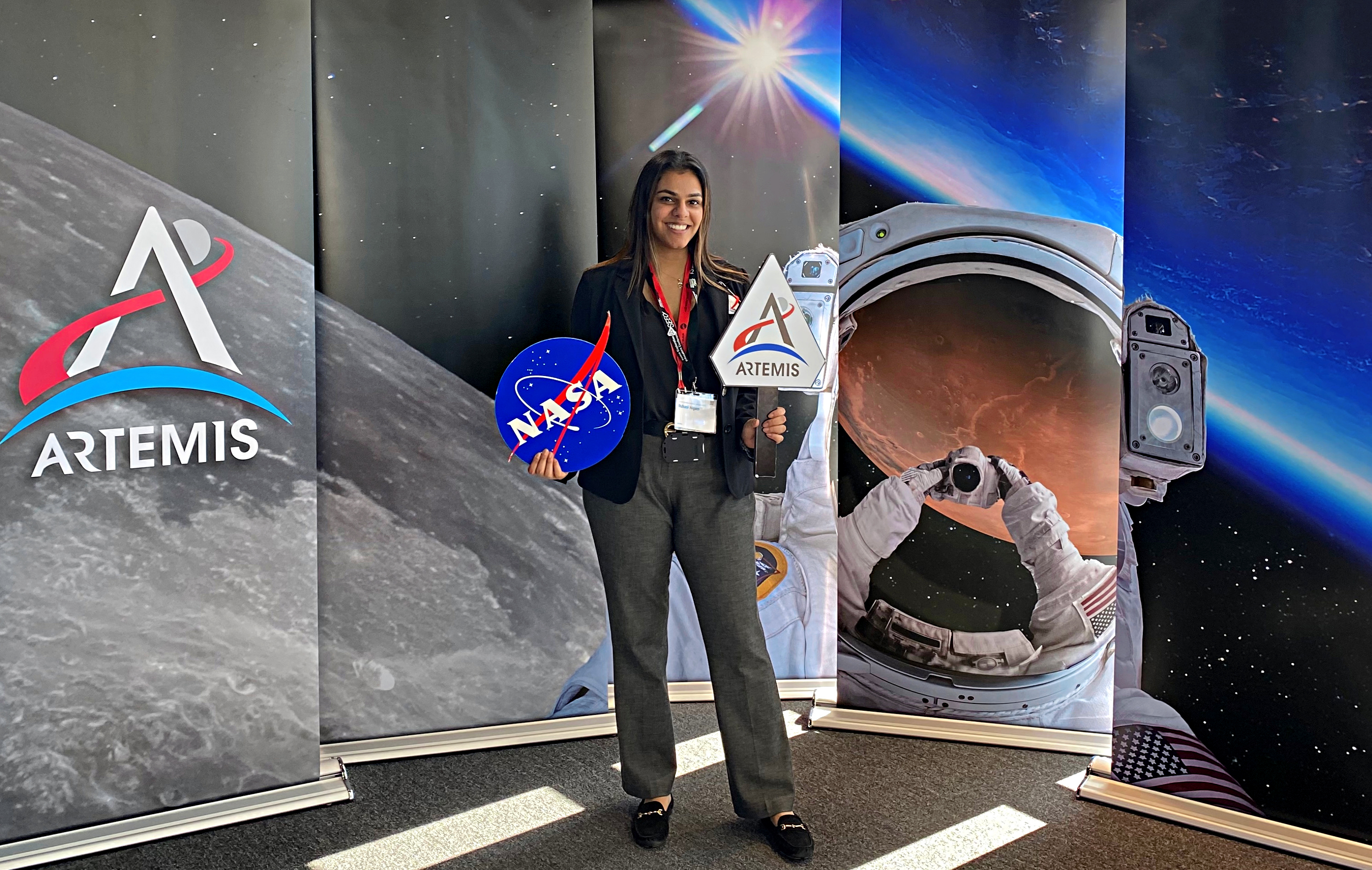
Northeastern student Ruhani Nigam, a third year Communications Studies major, is currently doing a co-op at NASA’s Johnson Space Center in Houston, Texas. She is part of the communications team for NASA’s Orion program. We recently caught up with her to learn more about her role, and how she prepared for such a major opportunity; read more below.
First and foremost, what exactly is Orion?
Orion is the only spacecraft designed for long-duration, human deep space exploration. Orion is an important part of NASA’s Artemis program to build a sustainable presence on the lunar surface and to prepare NASA to move on to Mars. Artemis III will be sending the first woman and next man to the moon by 2024.
What is your role at NASA?
My role is to communicate the significance of the Orion program to three main audiences: the general public, NASA’s key stakeholders, and employees at other NASA centers around the country. My responsibilities look different based on the audience I’m trying to reach. So far, my key responsibilities have been writing an event plan for Orion executives and employees, representing the Orion program at a STEM conference for high school teachers, and working on a children’s story book about Orion.
How did you prepare for role NASA?
Leading up to and during the first few weeks of the co-op, I researched the Orion Program and NASA’s history of space exploration. I started by researching the spacecraft itself, specifically which companies are constructing which parts and the functionalities of those parts. Then I moved on to the upcoming Artemis missions and why they are important in getting humans to Mars. Finally, I read through lengthy communication plans from past Orion tests outlining how NASA messaging was distributed through engagement campaigns, social media, and large-scale events.
What are some challenges and highlights of working at NASA?
In school, assignments are given concrete deadlines and guidelines. But at NASA, my assignments are constantly changing in response to government policy, flight test results, and several other factors. Because NASA is both a government agency and a tech organization, there are several people who have to approve decisions. Recently, I’ve been involved in planning an event where VIPs are invited to view the testing of a crucial motor on Orion. The Orion spacecraft is manufactured by Lockheed Martin in the US and Airbus in Europe. Since there are a lot of players involved who each have their own preferences, we respond to drastic changes, cancellations, and additions to the test event every single day. On a related note, since a large manufacturer like Lockheed requires different forms of information than the news media or a government agency, I have learned to quickly switch between a variety of communication styles. For instance, within a single week I might have to plan an event for NASA engineers, present at a conference alongside a manufacturer, and write an informational resource for students. The dynamic nature of NASA communications is challenging, but forces me to think quickly on my feet.

Are there any specific projects/adventures during your co-op that you’re looking forward to at this point?
A large part of my role on the Orion communications team is large-scale event planning. Not only have I had the opportunity to write and update event plans and represent NASA at a STEM conference at Space Center Houston, but I am also traveling to Washington DC to represent NASA at the US Science and Engineering Festival in April. I’m lucky to work on a team that prioritizes intern travel in order to network with other contributors in the field, and experience NASA’s impact nationally.
Why did you want to work at NASA? What inspired you?
My cousin, Varun, was the person who sparked my interest in space. He sadly passed away a few years ago, but as kids we would share a chair and read about NASA missions together on his old computer. Years later, I’m lucky to still have the same interest and passion at a time where space exploration is very relevant. People are looking to space for answers more than ever. Artists are singing about it, entrepreneurs are investing in it, and scientists are relying on it to predict the future of our planet. It’s a little surreal that I have the privilege of giving people those answers, and I have no one else but Varun to thank for that.
Any advice to students who are applying for a co-op or internship?
My advice would be to not be deterred from working in STEM fields as a communications major.
I find it challenging and rewarding to be able to learn about technical topics such as spacecraft technologies and planetary sciences and convey them in a more concise and generally understandable way. And on the other side, the minds behind these scientific findings are extremely appreciative of communications teams conveying their hard-earned findings to different audiences.


